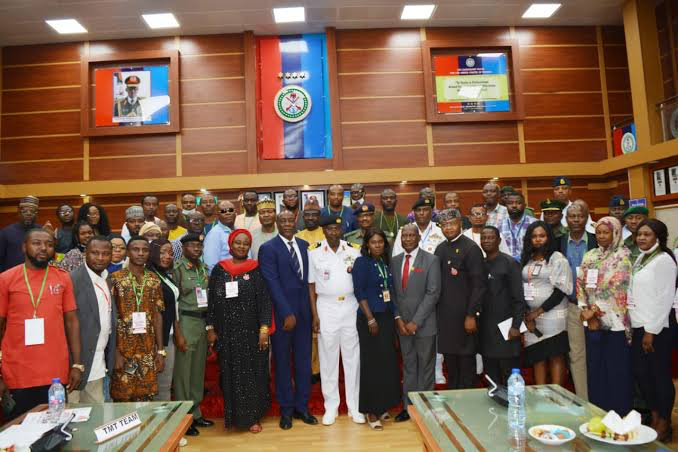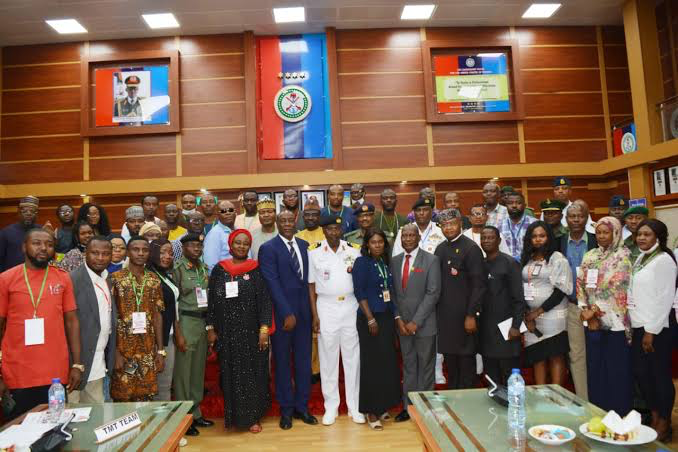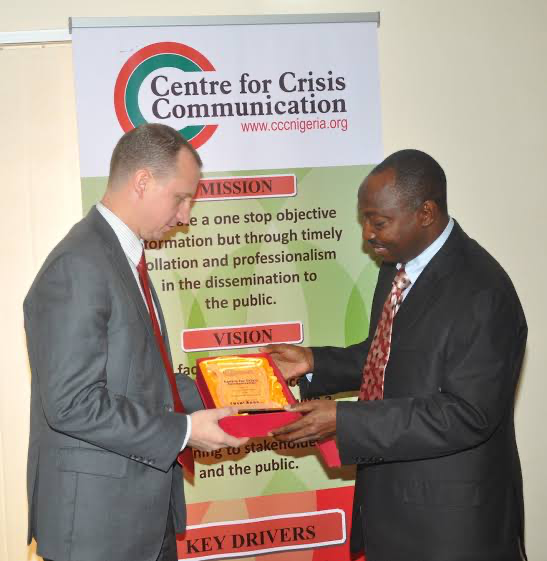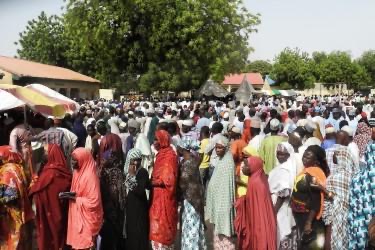COMMUNIQUE ISSUED AT THE END OF A THREE-DAY SEMINAR ORGANISED BY CENTRE FOR CRISIS COMMUNICATION ON MEDIA ENGAGEMENT IN CRISIS SITUATION FOR PUBLIC RELATIONS AND INFORMATION OFFICERS OF THE MILITARY, SECURITY AND RESPONSE AGENCIES IN NIGERIA HELD AT SANDRALIA HOTEL, JABI, FCT ABUJA FROM TUESDAY 26TH – THURSDAY 28TH APRIL, 2016.
1. The Three-Day seminar convened at the instance of the Centre for Crisis Communication (CCC) in partnership with the Defence Headquarters (DHQ) and support from the Nigeria Stability and Reconciliation Programme (NSRP), had as its theme, “Enhancing the Capacity of Public Relations and Information Officers of Mili6ary, Security and Response Agencies in Nigeria in Addressing Crisis Situations”. The Honourable Minister of Defence, Mansur Muhammad Dan-Ali declared the seminar open.
2. The main objective of the seminar was to partner with key stakeholders in the military, security and response agencies in the country to develop effective, efficient and responsive cadre of public relations and information officers to be better equipped to carry out the onerous responsibility of managing information during crisis situations in a most professional manner.
3. The Honourable Minister in his address called on all security agencies to crush and deter the threats of crisis and conflicts that have potential to breach the peace and security of Nigeria. He further acknowledged the thoughtfulness of the CCC and her technical partners “for initiating this very laudable programme and situating the imperative of continuous enhancement of capacity of the information officers of these critical institutions to be able to effectively manage sensitive crisis information at their disposal”.
4. Five participants were each drawn from the public relations and information departments of the following agencies: Defence Headquarters, Nigerian Army, Nigerian Navy, Nigerian Air Force, Nigeria Police Force, Department of State Service, National Intelligence Agency, Nigeria Customs Service, Nigerian Prisons Service, Nigeria Security and Civil Defence Corps, Federal Road Safety Corps, Federal Fire Service, Economic and Financial Crimes Commission, Independent Corrupt Practices and Other Related Offences Commission, Office of National Security Adviser, Nigeria Immigration Service, National Emergency Management Agency and some selected media organisations among others.
5. The seminar which had resource persons drawn from the academia, the media/public relations, the paramilitary services, as well as retired top-military brass covered several topics relating to crisis communication, crisis management, gender and conflict sensitivity, imperatives of inter-agency collaboration and media partnership.
6. Several observations including the following were noted:
a. That the over-centralization of information at the headquarters of most of the agencies often hampers the need to give timely response to the media in crisis situations.
b. That information officers and public relations personnel of most of the agencies are often reactive because they are not part of management meetings where they can build a PR component into most public policies. Hence, they often only react to the wave of public backlash generated by such policies.
c. That some agencies give inaccurate account of events to the media, while the media on their part do not utilize the appropriate and formal channels to request sensitive information from security and response agencies.
d. That some of the agencies have not been able to tap into the social media and maximize its use to their own advantage.
7. In the light of the aforementioned, the seminar resolved as follows:
i. There should be decentralization of information as much as possible, in which case, certain information has to come from the field rather than from the agency’s headquarters during crisis situations.
ii. Since PR and communication is a management function, information managers should be part of management meetings (if they are not) so that they can build a public relations angle to key management decisions.
iii. The seminar encourages institutions on the need for improved synergy among the defence, security and response agencies with regards to information sharing and jointness in operations.
iv. Defence, security and response agencies should continue to provide accurate and timely information to the media. The media should be harnessed by organisations to reach out to public.
v. Continuous training and retraining of information officers should be encouraged by all Services and Agencies. There is also need for continuous joint training for both media and information officers of the defence, security and response agencies to enhance mutual understanding of working environments of one another.
vi. Similar forums should be organized and even replicated in other geo-political zones of the country. This should be supported by stakeholders to ensure constant interface between information and PR professionals of the military, security and response agencies and the media.
vii. In view of the derivable benefits of Social Media, all information managers are encouraged to leverage on its usage to enhance the service delivery of their organisations to Nigerians.
viii. Information managers should continue to be proactive in addressing sensitive issues that border on national security through strategic communication and self-censorship.
ix. All PR and information managers of the defence, security and response agencies are encouraged to sustain the culture of professionalism and credibility.
-Air Commodore Yusuf Anas (Rtd))
Executive Secreatary CCC
-Emmanuel Okeh
Secretary FOSSRA
-Francis Enoboro
Head PR Prison Service




